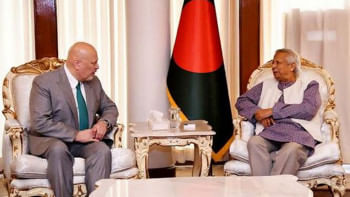An Italian fiesta: Celebrating the goodness of the Mediterranean diet

"Food, especially good food, brings people together. The Mediterranean diet and the Italian tradition include the notion of eating together and spending quality time with family and friends," the ambassador said. "And this is also what we have done on this event, by bringing people from various international, local, and business communities together."
And hence, the residence became a vibrant and lively place, with laughter and cheers and friends catching up, with the lawn hosting a number of stalls where cooks (mostly people from the Italian community in Bangladesh), made and presented the guests with delicacies of the country — from pizza and risotto to gnocchi (often referred to as Italian dumpling) and cotolette di melanzane (eggplant cutlets) and bagna cauda (a dip that is often served with vegetables).
In the heart of it all is of course Mediterranean diet, which is recognised by UNESCO as an Intangible Cultural Heritage of Humanity, along with the art of Neapolitan 'Pizzaiuolo', the traditional culinary art of the preparation and the baking of the dough.

Beatrice Kaldun, head of the office and UNESCO representative to Bangladesh, was also present during this event and spoke of these heritages in her speech.
The Daily Star was one of the media partners of the event. Mediterranean diet promotes healthy eating and healthy living. It is a broader concept than people sometimes make it to be. It is a heritage, comprising of various skills, rituals, traditions, etc. related to not just the production and cooking of food, but also the sharing and consumption of food. As for the choice of the food items, it places a lot of emphasis foods like fruits and vegetables, beans, nuts, fish, and olive oil. Consumption of dairy and meat products is also there, but in relatively smaller extents. Hence, the Mediterranean diet is often regarded as a healthy diet and lifestyle, nourishing not just the body with nutritious food, but also the mind, with the concept of eating together and strengthening community and family bonding.
This year the theme of World Week of Italian Cuisine was 'tradition and perspectives of Italian cuisine: awareness and enhancement of food sustainability'. The theme involves, among other things, a wide range of issues related to biodiversity, food diversity, biosphere reserves, and sustainable agricultural practices.
The Week also raised awareness against the Nutri-Score system of labelling on food packaging, which categorises food products on a five-colour scale according to their calculated nutritional scores. It has been argued that this system may provide a vague and distorted image of many Mediterranean foods which are generally considered to be very healthy.

"Extra virgin olive oil, which has many health benefits, has been deemed as being rather unhealthy (due to its fat content)," ambassador Enrico Nunziata exemplified. "Now of course, if you are using it for frying in large quantities every day, it is bad. It really depends on how you are using it and how much you are consuming, but a direct negative label does not take into account all that and may negatively influence consumers in their purchases."
Be it issues like food sustainability and biodiversity, or the debate of the aforementioned food labelling, or the protection of intangible cultural heritages, the World Week of Italian Cuisine tackled them all.
And the food fiesta at the ambassador's residence had been a medium to bring forward these conversations, in the most delightful and charming manner, with the help of delicious food and celebrations of the Mediterranean diet and Italian cuisine.


Photo: Sazzad Ibne Sayed


 For all latest news, follow The Daily Star's Google News channel.
For all latest news, follow The Daily Star's Google News channel. 



Comments